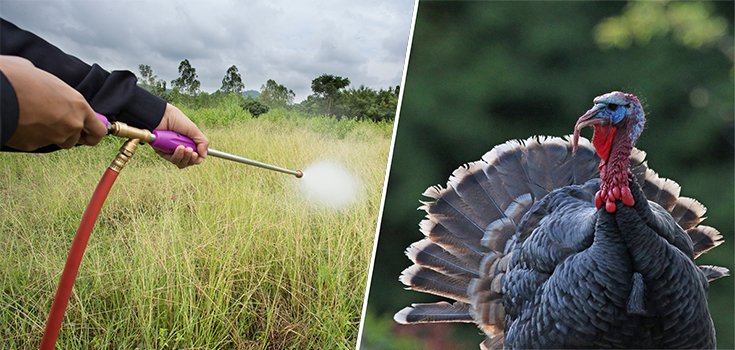Bee-Killing Neonicotinoid Pesticides Found in Canadian Wild Turkeys

The same class of pesticides known for decimating honeybee and other pollinator populations has been discovered in wild turkeys in Ontario, Canada, a study shows. [1]
Researchers from Canada examined the livers of 40 wild turkeys in southern Ontario and discovered that 9 of the birds had detectable levels of neonicotinoids, or neonics, a class of insecticides applied to crops such as corn and soybeans. The chemicals are taken up by the plant and distributed through its tissue as it grows. Here is a video showing more on how neonicotinoids work.
Two types of neonicotinoids were found in the turkeys’ livers – clothianidin and thiamethoxam – according to the study.
Neonicotinoids have been linked to the die-offs of honeybees and other pollinators in numerous studies. The pesticides can even cause death and reproductive problems in smaller birds.
Research shows that the water-soluble insecticides have spilled over from crops into a host of other plants, including maple trees, dandelions, and clover. An increasing number of studies have focused on the impact of neonicotinoids on insects and plants, but few have focused on the effects these chemicals have on wildlife.
Lead researcher Amanda MacDonald, who performed the research while a doctoral student at the University of Guelph, said the discovery of neonic pesticides in wild turkeys is reason for great concern.
“No levels of neonicotinoids can be good for any animal. It’s just a matter of finding out how it’s affecting them, but we know they’re killing bees, insects, and birds.”
According to MacDonald, the research team was contacted by the Ontario Federation of Anglers and Hunters, which believed they were seeing a drop in young turkeys in areas near where neonicotinoids were applied.
Published in the June issue of Environmental Science and Pollution Research, the study was conducted to determine whether neonicotinoids are present in wild turkeys; MacDonald hopes that in the near future, a long-term study will be conducted to find out if the pesticides are affecting the turkeys’ overall health.
The use of neonics is widespread in the United States and was banned by the European Union (EU) earlier in 2018. [2]
Some states have banned the sale of neonics, including Maryland. Some retailers, too, have banned their sale. In 2015, the home-improvement and gardening supply chain, Lowe’s, said it would stop selling products containing the insecticides.
In June 2018, the supermarket chain, Kroger, vowed to phase out neonic-containing products by 2020.
Most bans on neonicotinoids have been due to honeybee colony collapse disorder and concern for other pollinators.
Sources:
[2] ModernFarmer
